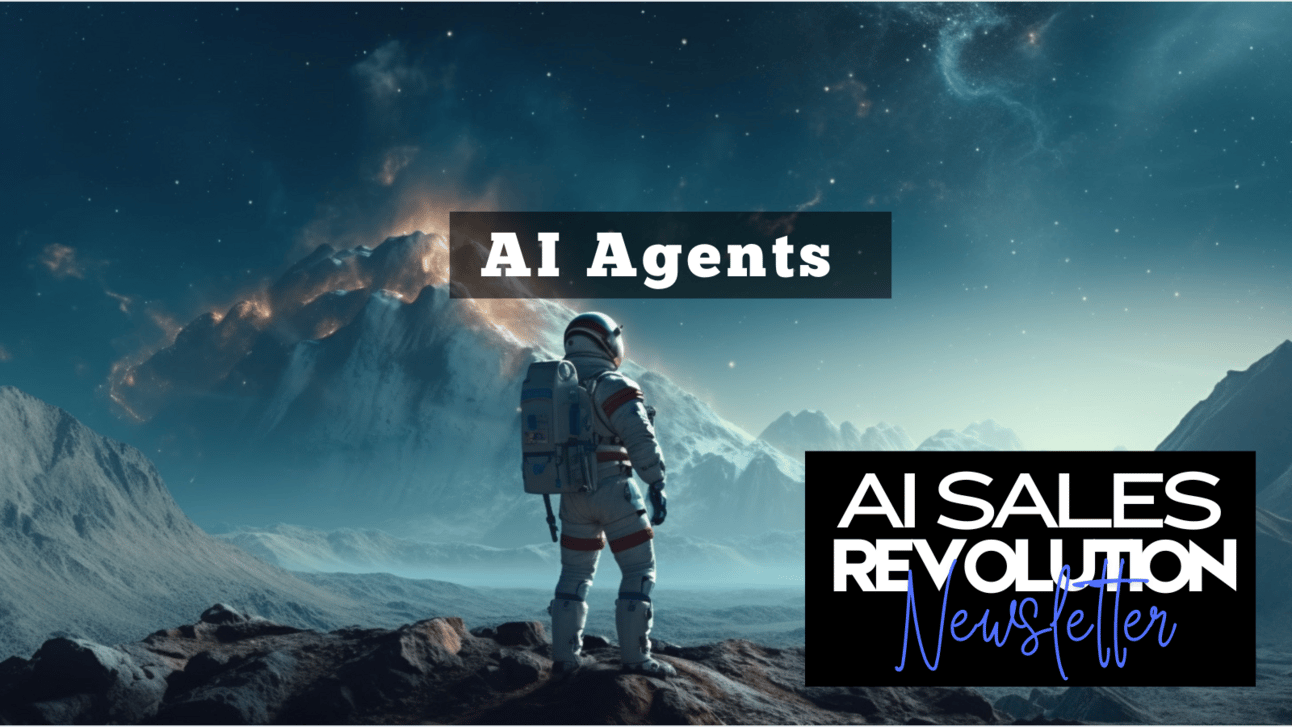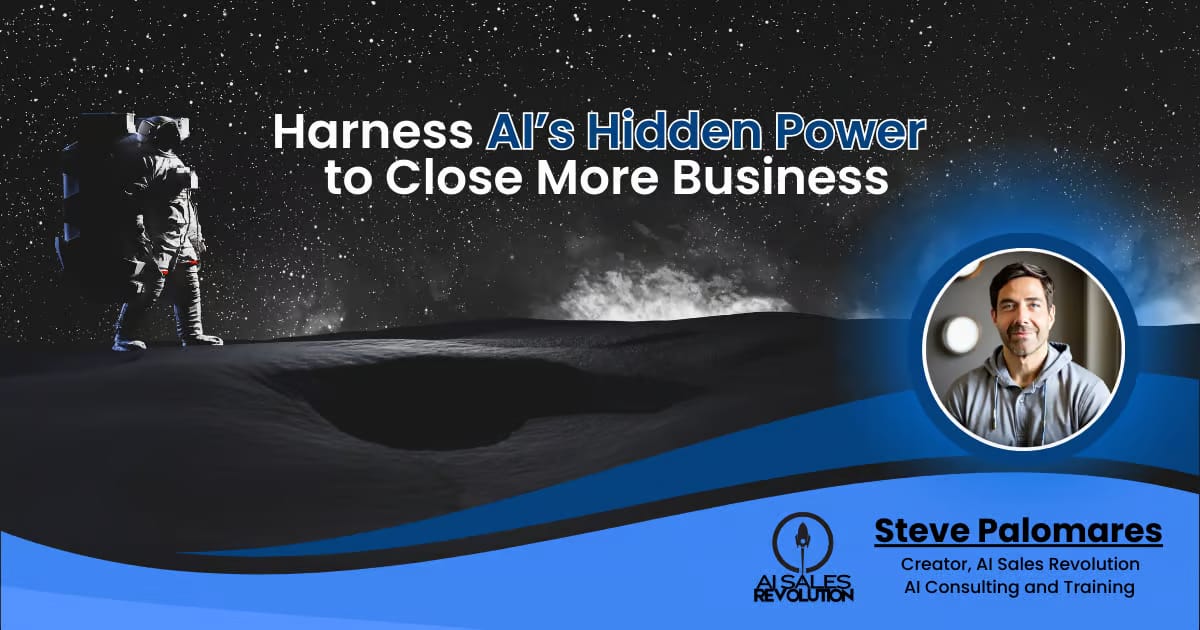- AI Sales Revolution
- Posts
- 🚀 How to Build an AI Agent & 10X Your Pipeline!
🚀 How to Build an AI Agent & 10X Your Pipeline!
The Bots Are Coming! Use Them to Grow Your Business


The Bots are not coming, they are already here!
Remember the old days of sales? Spending hours researching leads, cold-calling disinterested prospects, and manually logging every interaction. Our 60-hour weeks weren't dedicated to relationship building—they were consumed by grunt work that kept us from what we do best: connecting with customers and closing deals.
Fast forward to today. AI has flipped the script, it will handle the tasks that once devoured our days with greater accuracy and at scale...if you let it. Modern sales pros deploy AI agents that generate qualified leads overnight, craft personalized messages that resonate, and maintain perfect CRM records automatically.
The result? We're finally free to focus on what humans do best: building genuine connections, understanding nuanced customer needs, and applying the emotional intelligence no algorithm can match.
In this newsletter, we'll explore how AI isn't just changing sales—it's creating an entirely new playing field where success comes from working smarter, not harder, with AI as your silent partner.
Stat of the Week
More than 40% of sales professionals are now leveraging AI tools in their sales process, and companies utilizing AI in sales are seeing a noticeable increase in revenue.
This Week in AI Sales
What is an AI agent?
How to build your own AI agent
Tool of the week - Dust
The reality of AI capabilities (AI cannot replace humans in sales)
Let’s. Deep. Dive!
So, What Exactly is an AI Agent?
An AI agent is a software program that autonomously performs tasks, makes decisions, and interacts with users or other systems using artificial intelligence. In sales, an AI agent can act as a virtual assistant. It can send personalized emails, qualify prospects, analyze customer data, and even predict which leads are most likely to convert. Some of the more popular tools I am using are Lindy AI, Dust and Team AI.
AI agents can be as simple as chatbots that answer customer questions or as complex as fully automated systems that manage entire sales pipelines. They use technologies like natural language processing (NLP), machine learning, and predictive analytics to enhance their decision-making capabilities. By leveraging AI agents, businesses can streamline operations, improve efficiency, and scale their sales efforts far beyond what human teams could achieve alone.
How Can You Build Your Own AI Agent?
Don’t worry, you don’t need expert technical skills. Anyone can do this. Here are the steps:
1. Define Your AI Agent’s Role
Decide what tasks you want your AI agent to handle, such as:
Finding and qualifying leads
Sending personalized emails and LinkedIn messages
Automating follow-ups and reminders
Managing CRM updates
Providing insights and recommendations on deals
2. Choose the Right AI Tools
There are many AI-powered platforms that make it easy to build an AI agent. Here are some options based on functionality:
Lead Generation: Apollo.io, Seamless.AI, Clay.com
Email & Outreach Automation: ChatGPT (Custom GPTs), Smartlead, Instantly.ai, Reply.io
Conversational AI: ChatGPT API, ManyChat (for chatbots), Drift, Intercom
CRM Automation: HubSpot AI, Salesforce Einstein, Zapier (to connect different tools)
Now let’s Document Your Work for an AI Helper
Imagine you have a magical helper who can do your chores, but they've never been to your house before. You need to explain everything super clearly so they don't put your socks in the refrigerator!
Here's how to tell your AI helper exactly what to do:
Instructions for Documenting a Simple AI Agent Process
While each platform will be different, it will be easy to see where you add the type of prompt, the process flow, any context to add in and any systems to connect.
Here's a straightforward guide to help someone new to AI agents document their process:
1. Define Your Agent's Purpose
Start by clearly stating what your AI agent will do in one sentence:
"This agent will help sales reps qualify leads faster"
"This agent will draft personalized follow-up emails"
2. Outline the Input/Output Flow
Document what goes in and what comes out:
Inputs: What information will the agent need? (prospect details, conversation history, etc.)
Outputs: What will the agent produce? (email draft, qualification score, etc.)
3. List the Steps
Break down the process into 3-5 simple steps:
Gather information (what data gets collected)
Process information (what the AI does with it)
Deliver output (how results are presented)
4. Create a Simple Prompt Template
Document the basic prompt structure:
[Context for the AI]
Your role: You is a sales qualification assistant
[Instructions]
Analyze the following lead information and determine if they are a good fit based on:
- Budget alignment
- Timeline to purchase
- Decision-making authority
[Input data]
Company: {company_name}
Industry: {industry}
Annual Revenue: {revenue}
Contact Title: {title}
Recent Interactions: {interactions}
[Output format]
Qualification Score (1-10):
Key Strengths:
Potential Concerns:
Recommended Next Steps:5. Document Testing Examples
Include 2-3 examples of:
Sample inputs you tested
The outputs you received
Any adjustments you made to improve results
6. Note Integration Points
Simply state how this fits into your workflow:
"This agent is triggered when a new lead form is submitted"
"Sales reps activate this agent by clicking a button in Salesforce"
7. Track Performance Metrics
List 1-2 metrics to track success:
"Time saved per lead qualification: approximately 12 minutes"
"Qualification accuracy: 85% agreement with senior sales team"
🛠️ Tool of the Week: Dust
What if you could build your own sales AI assistant without writing a single line of code?
This week, I'm spotlight-ing a tool that's changing how sales professionals automate their workflows: Dust.
What is Dust?
Dust is a no-code platform that lets you create custom AI agents to handle repetitive sales tasks. Think of it as Lego blocks for building your own AI sales assistant. You connect your data sources, design your workflow, and Dust handles the complex AI parts behind the scenes.
Why I'm Excited About It
Unlike generic AI tools, Dust is built specifically for creating autonomous agents that can:
Monitor your CRM and take action based on specific triggers
Conduct research on prospects before your calls
Generate personalized outreach sequences that adapt based on responses
Provide real-time competitive intelligence during deals
Automate follow-ups with perfect timing
The best part? You can start simple and gradually hand over more complex tasks as you gain confidence.
Real-World Example
One of my colleagues used Dust to build an agent that monitors their pipeline, identifies deals that haven't moved in 14 days, researches recent news about those companies, and sends a personalized re-engagement email with relevant insights. This previously manual process now happens automatically, saving hours each week while improving response rates by 22%.
Getting Started
If you're new to AI agents, Dust offers templates to help you start with common sales workflows. Their visual builder makes it easy to customize these templates to your specific process without technical expertise.
Check out Dust at https://dust.tt/ and let me know if you create something cool! Next month, I'll be sharing my own Dust agent that's helping me qualify inbound leads with 85% accuracy.
Retry
Claude does not have internet access. Links provided may not be accurate or up to date.
Here Are The Agents I am Building!
1. Automated Lead Generation & Qualification
AI scrapes the web, social media, and databases to find high-potential leads.
Natural Language Processing (NLP) can analyze company news, job postings, and funding rounds to identify hot prospects.
AI chatbots and email responders can pre-qualify leads by engaging them with personalized questions.
2. Smart Personalization at Scale
AI can craft hyper-personalized emails, LinkedIn messages, and sales scripts based on a lead’s profile, behavior, and company data.
Dynamic email sequencing: AI adjusts outreach messaging based on engagement (opens, replies, clicks).
3. Predictive Analytics for Better Targeting
AI can analyze past deals to find patterns and suggest which prospects are most likely to convert.
Predicts the best time to reach out based on lead behavior and engagement history.
4. Automated Follow-ups & Nurturing
AI agents can send timely and relevant follow-up emails, messages, or even voice AI calls without manual effort.
AI-driven content recommendations (e.g., sending a relevant case study or blog post at the right moment).
5. Sales Enablement & Real-time Insights
AI can summarize sales calls, highlight objections, and suggest the best next steps.
Provides instant battle cards and responses based on a prospect’s industry and pain points.
6. CRM Automation & Data Entry
AI eliminates manual data entry by auto-updating CRM records, logging interactions, and assigning follow-up tasks.
Detects and removes duplicate or outdated contacts to keep the pipeline clean.
7. AI-powered Conversational Assistants
Chatbots and voice AI can handle initial conversations, book meetings, and even qualify leads 24/7.
AI sales assistants can suggest responses in real time during calls or chats.
8. Competitive Intelligence
AI monitors competitors, pricing changes, and industry trends to give sales teams a competitive edge.
Alerts sales reps about shifts in the market that could impact potential deals.
9. Social Selling Optimization
AI tracks LinkedIn and Twitter to find engagement opportunities and suggests content to share for thought leadership.
Notifies sales reps when key decision-makers interact with their content.
10. Voice & Video AI for Pitching
AI-powered call coaching provides real-time feedback on tone, speech, and keyword usage.
AI-generated video sales pitches tailored to individual leads can be sent at scale.
The goal of all of this? More deals with less effort!
s," without any coding knowledge. These AI agents can handle a variety of tasks, including customer support, sales, email management, and meeting scheduling, by integrating seamlessly with applications like Gmail, Zoom, and Twilio.

While AI is an incredible tool for efficiency and optimization, it lacks the human touch required to build deep relationships, handle complex negotiations, and truly understand the emotional nuances of a buyer’s decision-making process.
Sales is fundamentally about trust, empathy, and human connection—areas where AI still falls short. While AI can personalize emails and suggest responses based on past data, it cannot genuinely empathize with a prospect’s concerns or pivot creatively in a negotiation. Buyers often make decisions based on emotions, subtle cues, and personal interactions, which AI struggles to interpret accurately.
A skilled salesperson can read body language, detect hesitation, and adjust their approach in real time—something AI simply cannot replicate. This human intuition and adaptability are crucial for closing high-value deals and building long-term client relationships. That’s why, rather than replacing salespeople, AI serves as an invaluable assistant that amplifies your capabilities. The future of sales isn’t AI versus humans—it’s AI empowering humans to be more efficient, strategic, and effective in their roles.
AI Agent Action Items for the Week
Set Up & Configure Your AI Tools – Sign up for and integrate AI platforms like ChatGPT, Lindy AI, Dust to automate lead generation and outreach.
Create & Test an AI-Powered Outreach Sequence – Develop personalized email or LinkedIn message templates, then run a small test campaign to analyze engagement.
Train AI with Real Sales Data – Upload past customer interactions, common objections, and ideal customer profiles to refine AI responses and lead qualification.
Monitor, Optimize & Expand Automation – Track AI-driven interactions, tweak messaging based on performance, and explore additional AI features to enhance efficiency.
Thank you for reading about how advanced technology is changing the way salespeople operate. I hope you benefited from this article! The truth is learning to take full advantage of AI can really push you forward in your career. So, don’t miss out. Now is the time to embrace AI!
I am building a full playbook for my reps, let me know if you want a copy of it.
Steve


